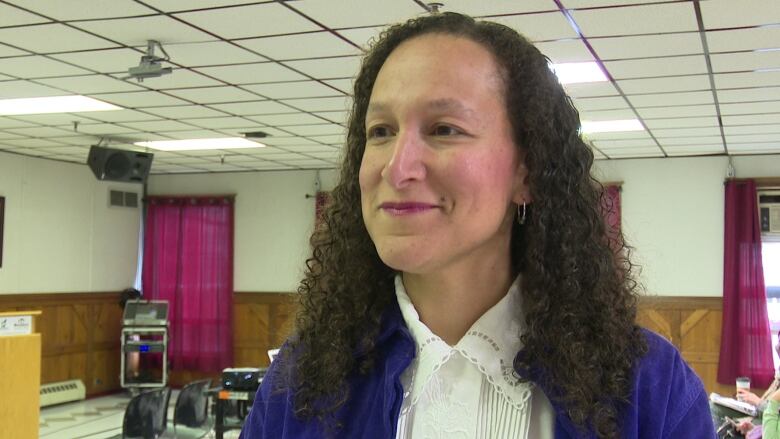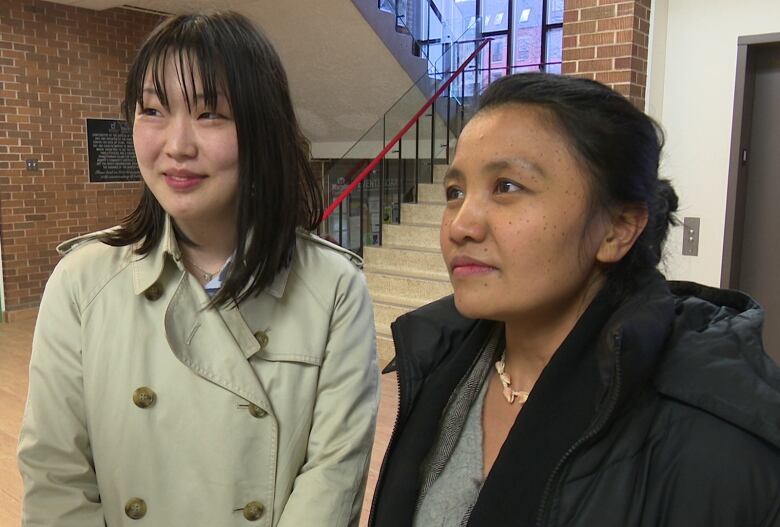Refugees Welcome Here! campaign makes stop on P.E.I.
Support groups give presentation on the realities of being a refugee

Islanders learned about the realities refugees face while settling in Canada and P.E.I. and got tips on howthey can be welcoming byusing social media and rebutting negative stereotypes.
Representatives with Amnesty International Canada, Amnistie internationale Canada, and the Canadian Council for Refugees gave a presentation at the Murphy's Community Centre Thursday evening with about 40 in attendance. It was part of a campaign called Refugees Welcome Here! which has three themes: refugee family reunification, fairness for refugee claimants, and protection for refugees from all regions. The campaign calls on people to takefive actions to help welcome refugees.
Digital activism
People learnedhow they can use social media as a tool tohelp myth-bust misinformation about refugees.7 shareable GIFs to debunk misconceptions have been created as part of the campaign.
"Social media is such an influencer these days and it's such a, a way to amplify our messages. We think it's a really powerful tool," said Christina Harrison Baird, the campaign's national coordinator and a lawyer specializing in international human rights and migration.
Be prepared to use the tools that we're putting out there to answer when someone says, "Well, what about security,"or those sorts of things.-Christina Harrison Baird
Baird said sharing positive news on social media, such as clothing drives or special welcomes at the airport, can help refugees feel more welcome and encourage others to think about what they can do. But she said people also need to be prepared that not everyone will agree with them.
"Be prepared to use the tools that we're putting out there to answer when someone says, 'Well, what about security,'or those sorts of things," said Baird.
Baird said the Atlantic provinces have been very welcoming of refugees and one of the goals is to build on that and widen the circle of people involved in front line welcoming.
Skeptical sentiments
Baird said it's important to acknowledge that people may question the capacity for Canada to welcome refugees when some don't have the services they need or are searching over a long period for employment.
"It's bound to make people wonder,well can we, do we have the capacity to welcome," she said.
Baird said people shouldkeep in mind that refugees want to give back tocommunities that embrace them and striveto establish themselves and be successful.
"There is enough sharing to go around," she said.
"In fact ... refugees are net contributors to the community. They bring different foods and different ideas and they bring innovation and they bring their own education."
Honeylyn Gubalane and Sayaka Omoriattended the session because they wanted to know how to welcome the Syrian refugee children in the class they teach at theMurphy's Community Centre.Gubalane wants to build a sense of community that might be lacking for those who have had to flee from their homes.
"We're trying to learn how can we relate to them. How can we connect with them," saidGubalane.
Omori hoped to learn more about refugees, their challenges and how to help make them feel safe and have fun.
"When I met the Syrian children, I didn't really know much about refugees," saidOmori.
"I was surprised that, like, first ofall, there's so many refugees still waiting for somewhere to settle, and that it takes a long time for them to come."

Right now there are about 60 million refugees across the globewaiting for a country to take them.
The speakers were invited by the P.E.I. Association for Newcomers to Canada partly to help counteract misconceptions about refugees.
"There are families that have already been through a lot of hardships,"said Nancy Clement, community outreach facilitator for the PEI Association for Newcomers to Canada.
"To have people misunderstanding them is difficult,"
She said P.E.I. is doing a good job welcoming refugees and the association wanted to give people who want to do more even more tools on how to help.
"We just want to try and smooth the path a little bit."
- MORE P.E.I. NEWS | Midwives could soon be part of P.E.I. health-care system
- MORE P.E.I. NEWS |P.E.I. Public Safety says being prepared is key to surviving emergencies












_(720p).jpg)


 OFFICIAL HD MUSIC VIDEO.jpg)
.jpg)



























































































